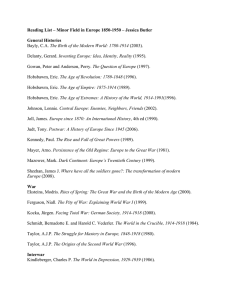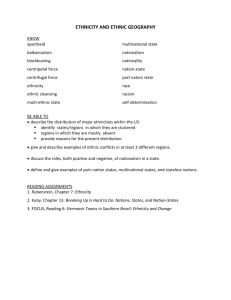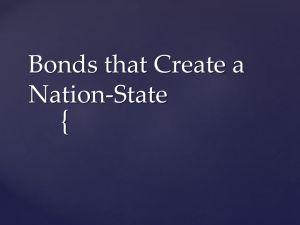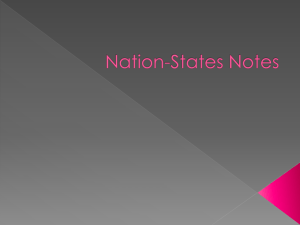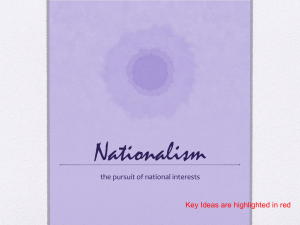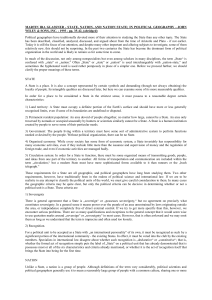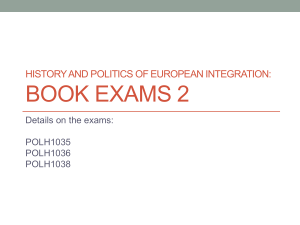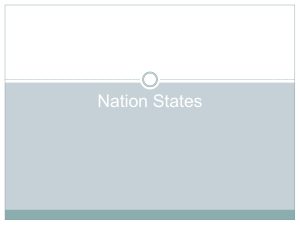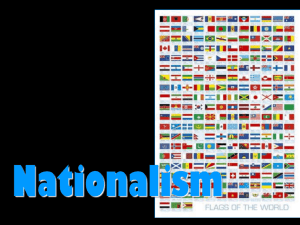Read: Ethnicity and Nationalism: (3
advertisement
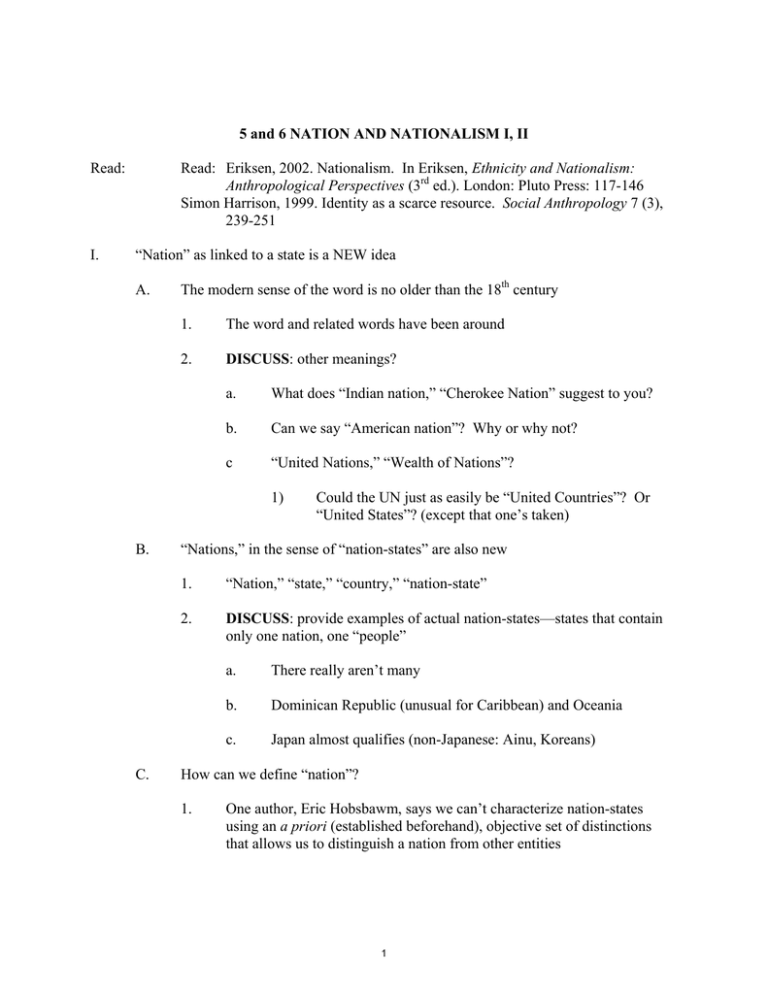
5 and 6 NATION AND NATIONALISM I, II Read: I. Read: Eriksen, 2002. Nationalism. In Eriksen, Ethnicity and Nationalism: Anthropological Perspectives (3rd ed.). London: Pluto Press: 117-146 Simon Harrison, 1999. Identity as a scarce resource. Social Anthropology 7 (3), 239-251 “Nation” as linked to a state is a NEW idea A. The modern sense of the word is no older than the 18th century 1. The word and related words have been around 2. DISCUSS: other meanings? a. What does “Indian nation,” “Cherokee Nation” suggest to you? b. Can we say “American nation”? Why or why not? c “United Nations,” “Wealth of Nations”? 1) B. C. Could the UN just as easily be “United Countries”? Or “United States”? (except that one’s taken) “Nations,” in the sense of “nation-states” are also new 1. “Nation,” “state,” “country,” “nation-state” 2. DISCUSS: provide examples of actual nation-states—states that contain only one nation, one “people” a. There really aren’t many b. Dominican Republic (unusual for Caribbean) and Oceania c. Japan almost qualifies (non-Japanese: Ainu, Koreans) How can we define “nation”? 1. One author, Eric Hobsbawm, says we can’t characterize nation-states using an a priori (established beforehand), objective set of distinctions that allows us to distinguish a nation from other entities 1 2 2. Each nation is the product of particular, localized, or regional historical conjunctures 3. It’s not like classifying birds or lizards, where you can work out a priori criteria 4. The criteria themselves are fuzzy, shifting and ambiguous (language, ethnicity) 5. Hobsbawm: a. Defining a nation by its members’ consciousness of belonging to it b. 6. But, Hobsbawm says that an initial working assumption might be: a. 7. Istautological (a circular argument), and provides only an a posteriori (afterwards) guide to what a nation is Any sufficiently large body of people whose members regard themselves as members of a “nation” DISCUSS: Exceptions? a. Israel? b. 1) Is Israel a “Jewish state”? If so, why? 2) Is Israel a “Jewish nation”? If so, why? Other examples? 1) II. Gladney: if Tibet were a free state, there would be similarities in how that state and its citizens would be conceptualized—Tibetan—would be close to a nation-state History of the concept of nation A. Root meaning of word: naissance, origin, descent (ancient French dictionary) 1. Nación was an aggregate of the inhabitants of a territory 2. Could be a province, a country, a kingdom a. Was used when speaking of foreigners 2 3 3. Words for “homeland”—one’s own place, township, land of birth: patria, tierra a. B. Territory of origin—pays natal (Old French) Meanings in the languages that used some form of “nation”: 1. German: foreigner (a loan word, contrasted with volk) 2. Territory of origin 3. Common descent group…ethnicity 4. Speaking the same language 5. We could consider Castile, in Spain to be one of the earliest European kingdoms approximating the “nation-state” idea a. C. D. In the 19th century in Europe, nation and nationalism developed in stages: 1. Originally seen as something purely cultural, literary and folkloric, not political 2. A body of pioneers and militants began promoting ‘the national idea’ in several countries—they were urban elites 3. Then nationalist programs start to acquire mass support This process sometimes occurs 1. Before the creation of a national state: Ireland 2. Sometimes afterwards: “We have made Italy, now we have to make Italians” 3. Sometimes never a. E. Abounded territory, a political unit, inhabitants spoke the Castilian language and shared the notion of being “Castilian” DISCUSS: Third World examples of #3? The meaning changed over the 19th century to include notion of a political body 1. Earlier: simply “the people”; later, the idea that this unit of people should have a government 3 4 III. Eighteenth century ideas about “the people” A. B. IV. American and French revolutions: ideas about “one nation” and one state 1. American colonists were distinguished from King George and his supporters neither by ethnicity nor language 2. At that time, many of the modern meanings of “nation” simply didn’t exist a. Ethnicity, common language, religion, territory b. Acommon history, historical memories shared by those seeking to establish themselves as a separate state 3. American goal: overthrow colonial oppressor, be independent of England 4. French: overthrow régime and the entire fixed hierarchy of royalty, nobility, clergy (Catholic Church), and replacing it with “Liberty, Brotherhood, Equality” Always present: the element of citizenship and mass participation 1. And desire to be a national state 2. French revolutionaries called one another “citizen” In the nineteenth century: A. The principle of nationality gained ground: its primary meaning was political 1. B. A “people” should constitute a state Eric Hobsbawm1 discusses major arguments that took place about the necessary preconditions 1. Had to be viable (culturally, economically, size) 2. Many arguments were made about size throughout the 19th century a. “Ridiculous” that Belgium and Portugal be states b. DISCUSS: examples of very small states today? Problems? 1 Eric Hobsbawm, Introduction. Nation as Novelty. Pp. 1-45 in Nations and Nationalism since 1780: Programme, myth, reality. Cambridge, 1990. 4 5 3. After World War I, the “principle of nationality” appeared in peace treaties a. Produced a Europe of 26 states (27 if we add Irish Free State) b. None of these were then, nor are now, nation-states (i.e., a single “people”) 1) 4. Notion of self-determination a. Yes the idea was present in independence movements (Latin America) during the century 1) b. The notion of each “people” needing to be independent and sovereign evolved during the late 19th and early 20th century But how to establish criteria for “a people”? 1. V. Except for Haiti’s in 1804, which no one accepted, really Empire was still very much present in Europe c. C. A recent study of regionalist movements in W. Europe alone counts 42 of them The French “people” did not all speak French, by any means a. The requirement that they speak French became a characteristic of French state-building b. Eriksen: speaking Breton was forbidden b. DISCUSS: other examples of imposition of a state language? Ideology of state = nation = people continued to develop A. Why this evolution from empires? 1. DISCUSS: examples of empires a. 2. British, French, Hapsburg, Ottoman An optional reading for next Monday’s (Oct. 3) class by Segal and Handler 5 6 a. B. 3. It is clear that “nation” ideology was closely linked to the development of modern states 4. A great deal of literature is concerned with this issue2 Empires did not see the need for a single “people” 1. C. Contends that this development is intricately tied to colonial activity in the rest of the world In fact, they exploited these differences: worked to increase divisions between subjects a. For example, the idea of “ethnic soldiering”—bring in soldiers from a different ethnicity/country to reduce the likelihood of alliances between civilians and military b. At times rulers used soldiers belonging to an ethnic group that was the traditional enemies of the population The idea emerged that strong states need citizens who think alike and share identity in various ways 1. 2. Notion of the right to rule conferred by divinity was losing legitimacy a. All states claim a monopoly on use of legitimate force b. But is very costly if force is the main way of maintaining rule Citizens of a state ideally would embrace one language, one heritage, one religion, etc., and so would agree to being ruled a. Loyalties to other groups came to be seen to compete with loyalty to the nation-state (family, religion) b. Familiar idea? 1) DISCUSS: current examples? 3. During the 19th century many subject populations made the argument that “a people need to be sovereign” 4. Newly recognized states’ legitimacy was based on concept of nation 2 See Benedict Anderson, 1983. Imagined Communities: Reflections on the origin and spread of nationalism. London, Verso. Ernest Gellner, 1983. Nations and Nationalism. Oxford: Basil Blackwell. 6 7 a. 5. Belgium, Serbia, Greece, Romania, Bulgaria Changes in the economic system also supported the shift a. Each territorially circumscribed state tended to pursue mercantilist policies as a unified whole b. Extra-territorial, transnational units played a larger role 1) Both prior to the nation-building period and currently 2) Earlier: Hanseatic League in Northern Europe is an example3 3) DISCUSS: present-day extra-territorial, transnational units? a) c. VI. International markets, international trade agreements, European Union Note that empires were still very much present 1) But they were colonial empires 2) Note that various populations in Europe continued to feel they were under colonial rule 3) June 28, 1914 Archduke Franz Ferdinand, AustroHungarian assassinated by a Bosnian nationalist, in effect beginning WWI How Nationalism was employed A. Nationalist movements gained in strength 1. National unification or expansion a. Germany, Italy, Greeks 1) B. At the moment of Italy’s unification, 2½ % of the population spoke Italian Hobsbawm points out that the concept of “nation” was manipulated 3 An alliance of trading guilds existing from the Middle Ages to the Early Modern period (from the 13th to 17th centuries) that monopolized trade in the Baltic and some parts of the North Sea. 7 8 1. There was no historical precedent whatever for the formation of Yugoslavia 2. No one questioned existing states’ multinationality—in Britain, France, Spain a. What these minority people felt wasn’t considered important 1) b. Many felt they were better off—bigger is better 1) 3. How, it was asked, could the Slovenes possibly manage by themselves? Evolutionary ideology was very strong: these small groups, languages, were seen to be doomed as civilization progressed a. DISCUSS: examples of “doomed” European languages you know about that didn’t die out? b. The evolution to larger units was seen as following natural law— inevitable c. Society was to evolve from family and tribe to a nation-state d. 4. And many individuals belonging to these groups did favor unification From the local to the regional, the national and eventually global 1) Familiar idea that at the next phase in human evolution, ethnic and national barriers will melt and dissolve 2) Attempts to construct artificial world languages (e.g., Esperanto) are an example Folklorization processes of cultures and languages a. Campaigns to preserve the dialects b. A new idea that contradicted the notion that these variants should be eliminated, in order to foster national unity through a single standardized language 1) Spaces opened up for thick Irish and Scottish accents on the stage…so long as safely reduced to appendages (Hobsbawm) 8 9 2) c. Songs in Neapolitan became positively valorized Folk museums were built; anthropologists were hired to recover oral traditions, etc. 9 MIT OpenCourseWare http://ocw.mit.edu 21A.226 Ethnic and National Identity Fall 2011 For information about citing these materials or our Terms of Use, visit: http://ocw.mit.edu/terms.
